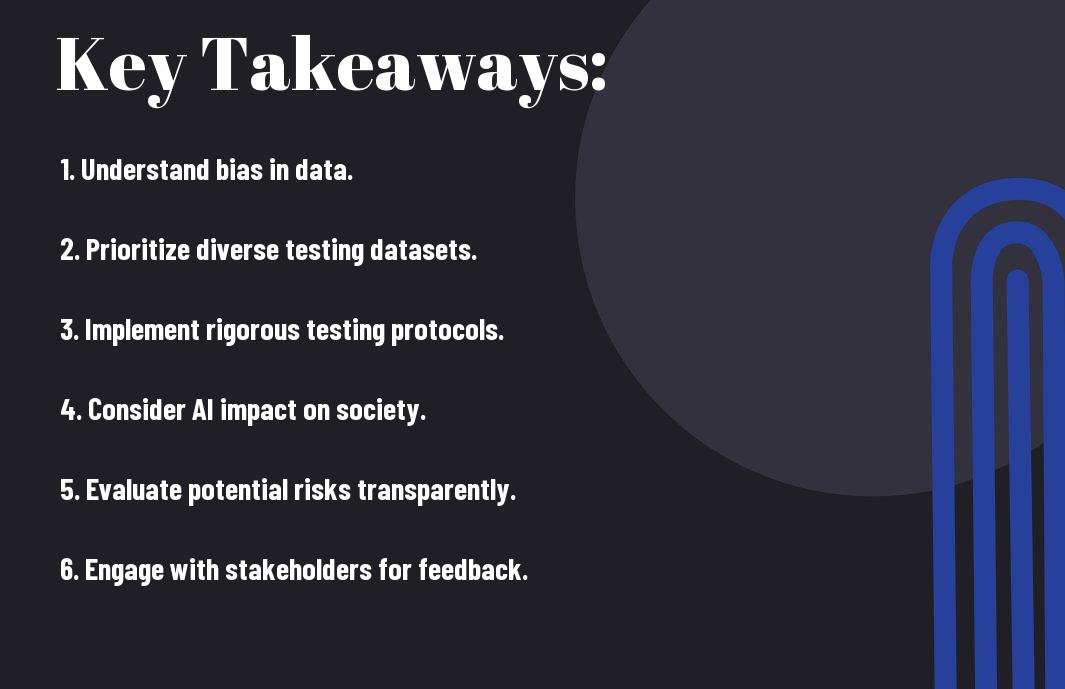You, as a developer or tester in Artificial Intelligence, hold a crucial role in upholding ethical standards. In this informative piece, we probe into expert tips provided by an AI ethicist to ensure that your AI testing practices align with ethical guidelines. By integrating these valuable insights into your workflow, you can navigate the complex landscape of AI testing with integrity and responsibility.

Key Takeaways:
- Implementing Diverse Testing Data: To ensure ethical AI testing practices, it is crucial to incorporate diverse data sets that represent different demographics and scenarios. This helps in uncovering biases and ensuring fairness in AI algorithms.
- Continuous Monitoring and Evaluation: AI ethicists emphasize the importance of ongoing monitoring and evaluation of AI systems post-deployment. Regular assessments can help identify any unintended consequences or ethical issues that may arise over time.
- Transparency and Accountability: It is important for organizations to be transparent about their AI testing methods and outcomes. Establishing clear protocols for accountability can help build trust with stakeholders and ensure responsible use of AI technology.
Laying the Foundation
Defining Ethical AI Testing Practices
On the journey to ensuring ethical AI testing practices, it is crucial to have a clear definition of what constitutes ethical behavior in AI development and testing. This involves aligning with established ethical frameworks, industry standards, and legal requirements.
The Importance of Human Oversight
Ethical AI testing practices require human oversight to ensure that decisions made by AI systems are aligned with ethical principles and do not cause harm. Human oversight is crucial in identifying biases, ensuring transparency, and making decisions that machines cannot make on their own.
Ethical AI testing practices necessitate a human touch to oversee the decisions made by AI systems. For instance, humans can intervene when AI algorithms display biased outcomes or make decisions that are ethically questionable. This oversight ensures that AI systems align with moral and ethical standards set by society.

Identifying Biases and Risks
It 8 Ways to Help Ensure Your Company’s AI Is Ethical is crucial for AI ethicists to identify biases and risks in AI systems to ensure their ethicality.
Detecting Implicit Biases in AI Systems
To maintain ethical AI testing practices, it’s important to be vigilant in detecting implicit biases in AI systems. These biases, often embedded in the data and algorithms used, can lead to discriminatory outcomes, impacting various groups unfairly.
Addressing Algorithmic Discrimination
Implicit in ethical AI testing is the need to address algorithmic discrimination. This involves actively working to mitigate biases that can lead to discriminatory decisions or actions by AI systems.
For instance, by regularly evaluating and refining algorithms, companies can minimize the risk of perpetuating discriminatory practices. Additionally, implementing diverse and inclusive datasets can help create AI systems that are more equitable and ethical in their outcomes.
Implementing Ethical Testing Methods
Keep 10 Steps to More Ethical Artificial Intelligence in mind when implementing ethical testing methods. It is crucial to ensure that AI technologies are developed and tested responsibly every step of the way.
Designing Fair and Transparent AI Models
Methods for designing fair and transparent AI models involve considering diverse datasets, ensuring algorithmic fairness, and providing transparency in the decision-making process for stakeholders.
Ensuring Accountability in AI Decision-Making
Implementing accountability in AI decision-making processes requires setting up clear guidelines and governance structures, as well as establishing mechanisms for oversight and control to prevent unethical outcomes.
Fair accountability measures can include regular audits, establishing review boards, and ensuring that AI systems are designed to uphold ethical principles throughout their lifecycle.
Summing up
Now armed with expert insights into ethical AI testing practices, it is clear that while AI technology holds tremendous potential, it also poses ethical challenges that must be carefully considered. By following these tips from an AI ethicist, organizations can ensure their AI systems are developed and tested in a responsible and ethical manner, fostering trust and transparency with users and stakeholders.
FAQ
Q: Why is ensuring ethical AI testing practices important?
A: Ensuring ethical AI testing practices is crucial to prevent unintended consequences, biases, and harm resulting from AI systems. By following ethical guidelines, we can build trustworthy and responsible AI technologies.
Q: What are some key considerations for ethical AI testing?
A: Some key considerations for ethical AI testing include transparency in testing methodologies, addressing biases in datasets, ensuring user privacy and consent, and regularly evaluating the impact of AI systems on society.
Q: How can AI ethicists help in ensuring ethical AI testing practices?
A: AI ethicists play a vital role in guiding organizations and developers to navigate complex ethical dilemmas in AI testing. They provide expertise in ethical frameworks, offer critical perspectives, and advocate for the responsible development and deployment of AI technologies.











